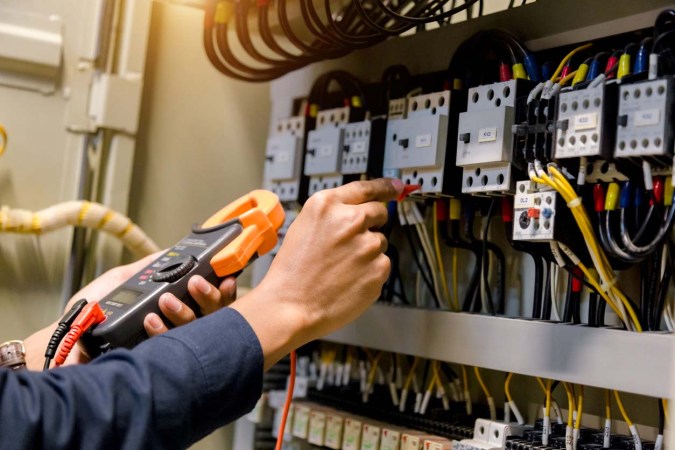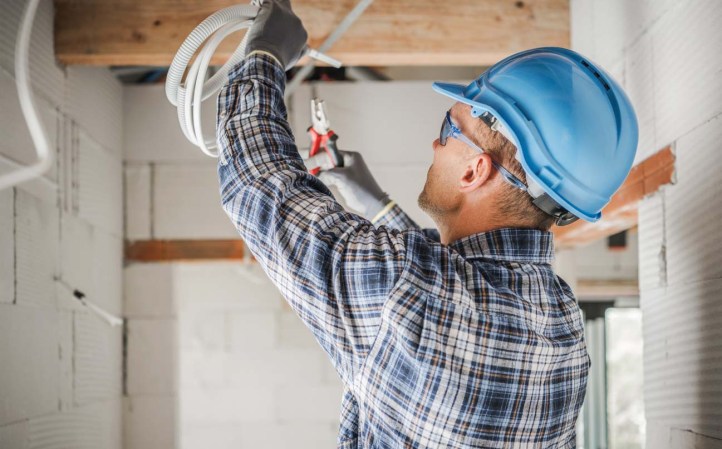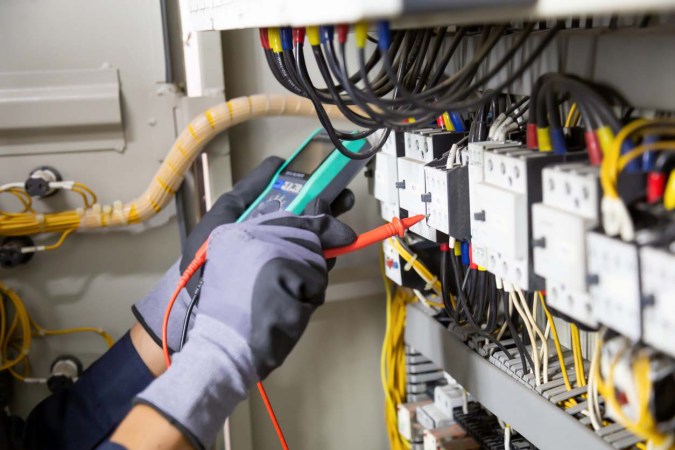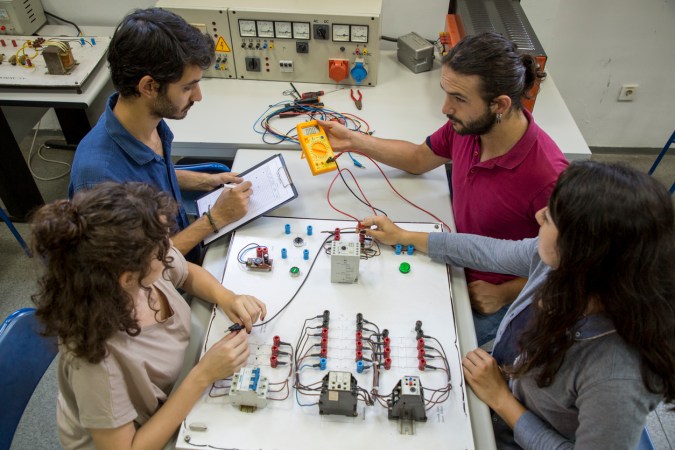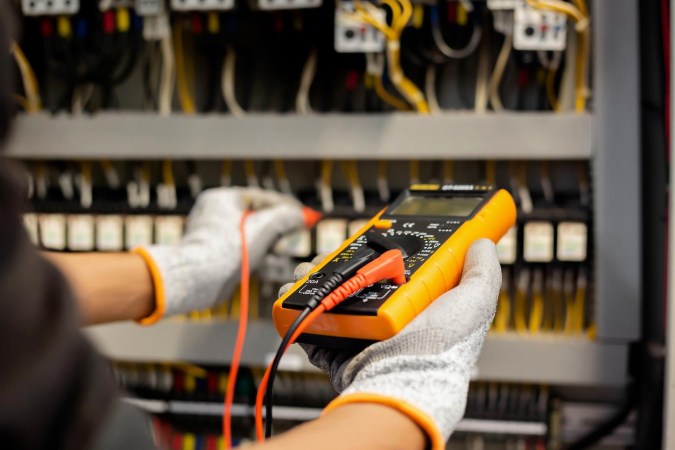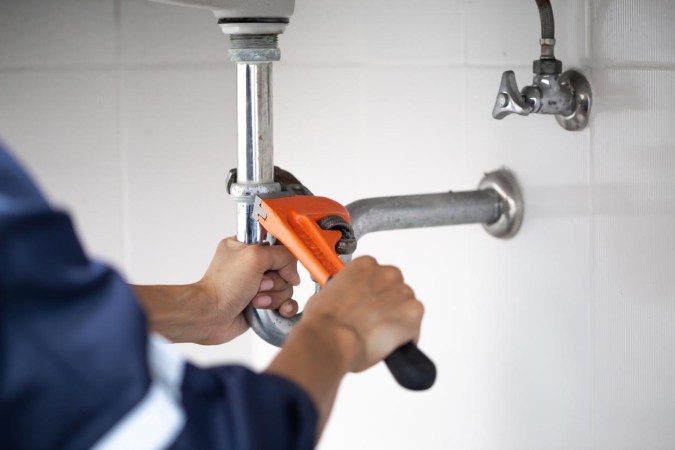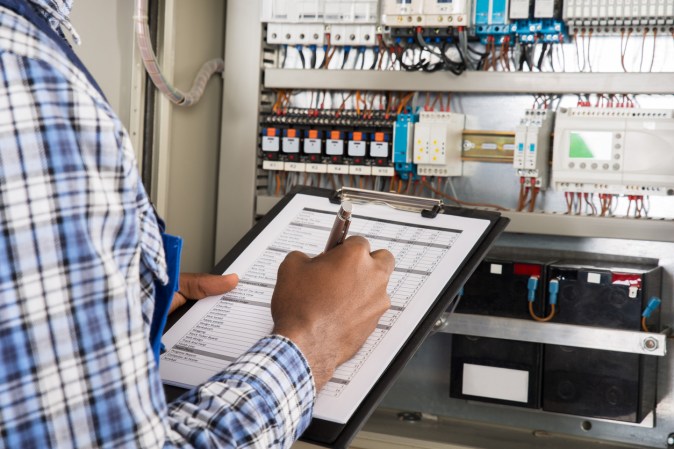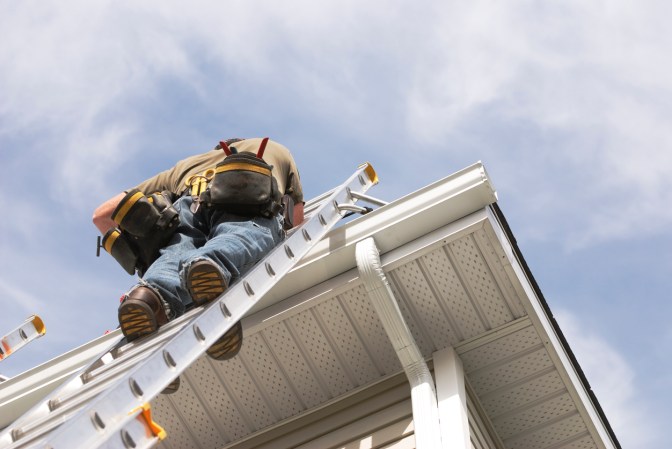We may earn revenue from the products available on this page and participate in affiliate programs. Learn More ›
Q: I’m considering my career options and know I want to work in the trades, so I’m looking into how to become a licensed electrician. However, I’m not sure whether I want to be a residential electrician or specialize in a certain area. What does an electrician do specifically, and how can I decide which path to take?
A: Electricians are skilled professionals who are instrumental in ensuring electrical features in residential and commercial spaces are safe and functional. With a comprehensive understanding of electrical systems, they manage a variety of maintenance tasks, from basic wiring installations to complex appliance fittings. Becoming an electrician can be a solid career choice; the U.S. Bureau of Labor Statistics reports an average electrician salary of $60,240 per year or $28.96 per hour.
Many electricians focus on residential clients, aiming their services at homeowners facing electrical repairs or maintenance issues, but the scope of an electrician’s expertise extends far beyond these common scenarios. Learning about the specific roles and services provided by a licensed electrician can help an aspiring electrician decide where they want to go with their career.
And when it comes to getting jobs, electricians will want to clearly state the services they offer. “Homeowners might overlook calling an electrician for tasks like upgrading electrical panels, installing new outlets, or addressing flickering lights,” explains Michael Branover, owner of Los Angeles-based electrician service Branover Contractors, Inc. “However, you should hire a licensed professional to ensure compliance with safety codes and prevent electrical hazards.”
Here’s what individuals need to know about different types of electricians and the various tasks they can perform.
Electricians work on the installation, repairs, maintenance, and upgrades of electrical systems in a variety of settings.
According to Lincoln Technical Institute, electricians work in a diverse range of environments, including residential, commercial, and industrial settings. A residential electrician focuses on installing and maintaining electrical systems in homes, ensuring that lighting, heating, and power distribution are functioning safely and efficiently. A commercial electrician typically works on large-scale projects, such as wiring office buildings, retail stores, and other business establishments. where there is a demand for reliable electrical infrastructure. Within industrial settings, an electrician’s work becomes even more specialized, as complex machinery and high-powered electrical systems in factories and manufacturing plants are often involved.
Regardless of the setting, anyone who works as a professional licensed electrician must have a certain amount of training and experience under their belt to ensure they understand the basics of installing, repairing, and maintaining electrical systems. David Walter, a master electrician and the founder and CEO of electrician training website Electrician Mentor, notes that licensing requirements vary widely by state, but electricians typically need at least 5 years of experience doing electrical work, plus about 150 to 200 hours of classroom time each year. He adds that electricians typically undergo formal training through apprenticeship programs or vocational schools.
“Many pursue certifications, such as those from the National Joint Apprenticeship and Training Committee (NJATC) or the Independent Electrical Contractors (IEC),” Branover says. Electricians can also opt to attend one of the best online electrician schools to help start their career or pick up additional skills that can help move their career forward.
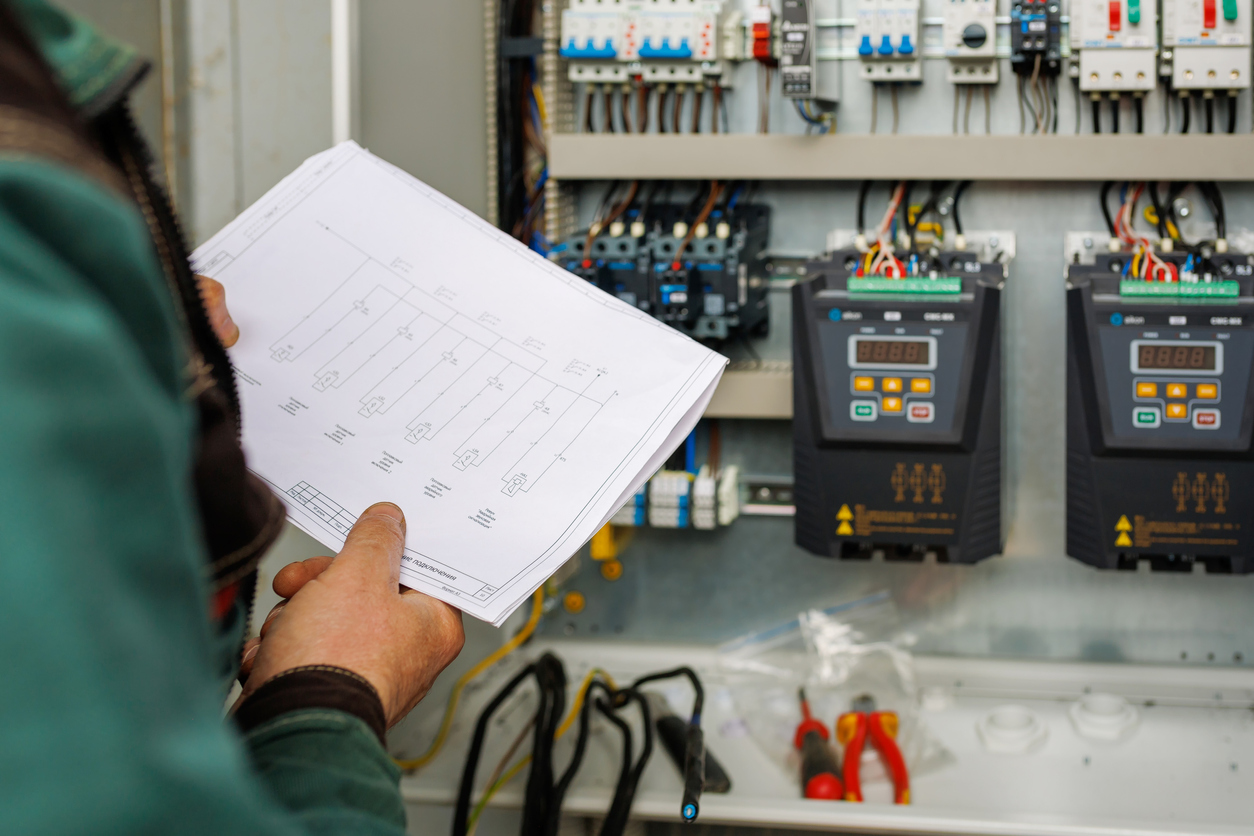
An electrician is able to read and understand technical documents such as blueprints and circuit diagrams.
According to the New England Institute of Technology, an integral skill for electricians to have is the ability to read and comprehend technical documents, including blueprints and circuit diagrams. Being proficient in reading these documents is crucial for multiple aspects of electrical work. It enables electricians to effectively navigate and repair existing electrical systems—identifying potential issues and implementing solutions based on the detailed layouts these documents provide.
Additionally, this skill is indispensable when electricians are planning and executing the electrical wiring in new buildings. By interpreting these technical documents, electricians can ensure that the electrical infrastructure is designed efficiently and safely.
Electricians can troubleshoot and diagnose issues with electrical systems and can perform inspections to ensure a building’s electrical systems are up to safety codes.
Electricians are adept at troubleshooting and diagnosing problems within electrical systems; this is a skill that is essential for the safety and efficiency of a building. Having this expertise allows them to quickly identify the cause of issues, whether it’s power outages, flickering lights, or malfunctioning equipment. This diagnostic process often involves an inspection of wiring, circuits, and electrical components to pinpoint discrepancies or faults.
Beyond resolving immediate problems, electricians also perform thorough inspections of a building’s electrical systems. These inspections are critical to ensure that all electrical installations comply with local and national safety codes. By conducting these assessments, electricians can detect potential hazards, such as outdated wiring or overloaded circuits, and recommend necessary upgrades or repairs to maintain safety and functionality.

An electrician may have specialized training to work on transportation equipment, motor vehicles, avionics, or solar rooftop panels.
Electricians often expand their expertise through specialized training, enabling them to work on a variety of complex systems beyond traditional electrical setups in buildings. This specialized training can include transportation equipment, where electricians learn to manage and repair the electrical components of trains, trams, and other transit systems.
In the automotive sector, electricians acquire skills to address the intricate electrical systems in motor vehicles, including advanced electric and hybrid cars.
For those focusing on avionics, electricians delve into the electrical aspects of aircraft, ensuring that navigation, communication, and other critical systems function flawlessly. Additionally, with the growing demand for sustainable energy, many electricians receive training to install and maintain solar rooftop panels, which is a key component in renewable energy infrastructure.
Residential electricians perform installations of wiring, outlets, and lighting in homes and apartments.
Whether it’s a new build, a routine repair, or a comprehensive remodel, residential electricians ensure the electrical aspects of homes and apartments are safely and efficiently managed. Homeowners often pay an electrician the cost to rewire a house rather than taking it on themselves, since this project is difficult and can be dangerous. This also includes the installation of outlets, which are crucial for the everyday use of appliances and electronics, and lighting fixtures, which enhance the ambience and functionality of a room.
Beyond new installations, residential electricians also perform electrical repairs, which may include issues such as short circuits, faulty wiring, or malfunctioning outlets. Their expertise is particularly valuable in remodeling projects, where updates or expansions to existing electrical systems are often required.
Commercial electricians perform electrical work in buildings such as offices, restaurants, and stores.
Commercial electricians bring their expertise to a variety of businesses to meet the unique and complex demands of commercial electrical systems. They handle an array of tasks to ensure that the electrical infrastructure meets the specific needs of each business. This includes wiring projects, which are often more extensive than in residential settings, requiring a detailed understanding of the higher power needs and safety standards of commercial spaces.
Another aspect of commercial electricians’ work is the installation or replacement of electrical panels, which must be robust enough to handle the heavy electrical load typical in commercial settings. Additionally, commercial electricians are skilled in installing specialized lighting systems that, similar to residential homes, illuminate the space while also enhancing the aesthetic appeal and functionality.

Industrial electricians perform electrical installations, maintenance, and repairs in factories, plants, and warehouses.
Industrial electricians are key players in the operation and maintenance of large-scale production and storage facilities, such as factories, plants, and warehouses. They perform electrical installations and ensure that new machinery and systems are correctly and safely integrated into existing electrical frameworks.
Maintenance and repairs are also a significant part of an industrial electrician’s duties. They may tackle issues with high-voltage systems and equipment, which are typical in industrial settings. These electricians have an understanding of industrial electrical components, including transformers and motor controls, which are vital for the smooth operation of heavy machinery. Their knowledge extends to diagnosing and fixing complex issues that could disrupt production or compromise safety.
The expertise of industrial electricians is crucial in these environments. This is not only for the efficiency and continuity of operations but also because it’s necessary to adhere to stringent safety standards. This makes these types of electricians indispensable in the industrial sector.
Marine electricians perform installation, maintenance, and repairs of electrical systems in boats and ships.
Marine electricians specialize in unique challenges, working on a variety of vessels ranging from small boats to large ships. They have expertise in the installation, maintenance, and repair of complex electrical systems that are constantly exposed to the harsh conditions of the marine environment. These professionals are adept at handling a wide array of electrical components, including critical systems such as lighting, which ensures visibility and safety on board, and wiring, which must be robust and resistant to moisture and salt.
Electricians who specialize in this area also help maintain and repair a boat or ship’s navigation and communication equipment, which are essential for the safe and efficient operation of the vessel.

Maintenance electricians perform testing, inspections, maintenance, and repairs in commercial, residential, or industrial settings.
Maintenance electricians are equipped with the expertise and versatility to handle a wide range of electrical challenges, from performing planned maintenance checks to addressing electrical emergencies. Responsibilities include conducting thorough testing and inspections to ensure systems are functioning optimally and adhering to safety standards. A significant part of their job involves routine maintenance, which helps in pre-empting potential electrical issues and extending the lifespan of electrical components. When problems do arise, these electricians are skilled in diagnosing and quickly repairing malfunctioning equipment, minimizing downtime and disruption. A maintenance electrician can easily identify the warning signs of dangerously outdated electrical wiring and write up a quote for what it will take and how much it will cost to solve the problem.
In many cases, maintenance electricians also serve as emergency electricians, offering critical services around the clock. This readiness to respond at any hour is essential for addressing urgent electrical failures that may pose safety risks or significant inconvenience. Electricians who offer emergency services will want to advertise this fact, making it easy for homeowners to find a reliable 24/7 electrician in their local area and keep their number handy in case they encounter such an electrical emergency.
Outside lineman electricians work on power lines, communication cables, and fiber optics.
An outside lineman electrician is a specialized professional who assists in the installation and maintenance of outdoor electrical infrastructure. Their work primarily involves handling power lines, communication cables, and increasingly, fiber optics, ensuring that these vital services are efficiently and safely established and maintained.
This type of electrician typically spends a significant portion of their job working with high-voltage electrical lines, often at considerable heights. This aspect demands not only technical proficiency but also a strong adherence to safety protocols. As a result, outside linemen undergo rigorous safety training to equip them with the skills and knowledge necessary to navigate these hazardous conditions. This electrical training covers a range of safety practices and emergency response techniques, ensuring that they can perform their duties with utmost caution and precision.
A journeyman electrician completed an electrical apprenticeship and obtained a license to work independently on a range of electrical tasks, such as installations, repairs, and maintenance.
Reaching the status of journeyman electricians represents a significant milestone in the electrical trade. The tasks this type of electrician might perform includes installations, repairs, and maintenance in various settings.
To achieve the status of a journeyman, an individual must first complete an extensive electrical apprenticeship. This apprenticeship is a rigorous period of on-the-job training and education, where they learn the intricacies of the trade under the guidance of experienced electricians. Following this training, aspiring journeyman electricians must successfully pass examinations to obtain their license. This licensure is a testament to their proficiency and understanding of electrical codes, safety practices, and the practical application of their skills.
A master electrician has completed a certain number of years in the field and has obtained a master electrician license from their local government.
Master electricians represent the pinnacle of expertise and leadership in this trade. As leaders in their field, these professionals mentor the next generation of electricians, imparting their knowledge and expertise to apprentices and journeyman electricians, and shaping the future of the electrical trade.
With their extensive experience and advanced credentials, master electricians are qualified to oversee significant electrical projects. They also effectively manage teams consisting of journeyman and apprentice electricians. Achieving the status of master electrician requires not only a substantial number of years of hands-on experience in the field but also the successful acquisition of a master electrician license issued by their local government. This licensure is obtained after an electrician demonstrates a comprehensive mastery of the electrical trade through rigorous testing, encompassing a deep understanding of electrical codes, advanced technical skills, and an ability to solve complex electrical problems. Master electricians ensure that all aspects of a project are executed efficiently, safely, and in compliance with all regulatory standards.
When a potential customer is looking to hire a local electrician for a specific project, they will need to consider the nature of the task at hand and the expertise required. Different electrician services cater to various needs, ranging from residential wiring to complex industrial installations. It’s important that customers select an electrician contractor who not only has a proven track record in the relevant field but also possesses the best electrician tools and equipment to efficiently and safely complete the job. Electricians will want to clearly state their area of expertise on their marketing materials, including their website and business cards, so potential customers will know exactly what type of electrical jobs they can complete.
Additionally, contractors will want to advertise their average electrician hourly rate so potential customers know exactly how much an electrician costs. They may choose to list an hourly rate, per-project rate, or even be more specific by including the cost to replace an electrical panel or the cost to install a home EV charger. When coming up with rates, electricians will want to take into account the complexity of the work, their experience level, their geographic location, and the electrician salary they want to make.
Finally, electricians will want to keep a list of satisfied customers on hand to use as references for potential new customers. This allows customers to more thoroughly vet the electrician to determine whether or not to hire them. Walter advises that homeowners ask for referrals once they’ve confirmed an electrician has the appropriate licenses, experience, permits, and training to complete their job. “[Ask for] satisfied customers who are willing to talk about their experience,” he says. “If the electrician doesn’t have them, you might want to go in another direction.”
A career as an electrician can be rewarding, challenging, and lucrative. Individuals have many options when it comes to choosing a career path; they can opt to work on residential projects or choose to specialize and work with transportation, solar panels, or even boats.


